Exam 6: Measuring Total Output and Income
Exam 1: Economics: the Study of Choice138 Questions
Exam 2: Confronting Scarcity: Choices in Production193 Questions
Exam 3: Demand and Supply243 Questions
Exam 4: Applications of Demand and Supply108 Questions
Exam 5: Macroeconomics: the Big Picture243 Questions
Exam 6: Measuring Total Output and Income228 Questions
Exam 7: Aggregate Demand and Aggregate Supply223 Questions
Exam 8: Economic Growth221 Questions
Exam 9: The Nature and Creation of Money267 Questions
Exam 10: Monopoly229 Questions
Exam 11: The World of Imperfect Competition227 Questions
Exam 12: Wages and Employment in Perfect Competition173 Questions
Exam 13: Interest Rates and the Markets for Capital and Natural Resources161 Questions
Exam 14: Imperfectly Competitive Markets for Factors of Production178 Questions
Exam 15: Public Finance and Public Choice179 Questions
Exam 16: Inflation and Unemployment132 Questions
Exam 17: International Trade179 Questions
Exam 18: The Economics of the Environment144 Questions
Exam 19: Inequality, Poverty, and Discrimination134 Questions
Exam 20: Macroeconomics: the Big Picture104 Questions
Exam 21: Measuring Total Income and Output134 Questions
Exam 22: Aggregate Demand and Aggregate Supply120 Questions
Exam 23: Economic Growth124 Questions
Exam 24: The Nature and Creation of Money183 Questions
Exam 25: Financial Markets and the Economy158 Questions
Exam 26: Monetary Policy and the Fed175 Questions
Exam 27: Government and Fiscal Policy177 Questions
Exam 28: Consumption and the Aggregate Expenditures Model199 Questions
Exam 29: Investment and Economic Activity115 Questions
Exam 30: Net Exports and International Finance202 Questions
Exam 31: Macro Inflation and Unemployment135 Questions
Exam 32: Macro a Brief History of Macroeconomic Thought and Policy120 Questions
Exam 33: Economic Development107 Questions
Exam 34: Socialist Economies in Transition129 Questions
Select questions type
Whenever MB > MC, the decisionmaker should do _______ of the activity.
(Multiple Choice)
4.8/5  (34)
(34)
An efficient allocation of resources is also an equitable allocation of resources.
(True/False)
4.8/5  (37)
(37)
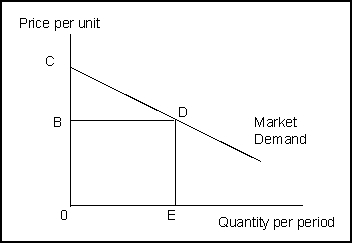 -(Exhibit: Surplus and Demand)The total benefit of consuming OE units is given by the area:
-(Exhibit: Surplus and Demand)The total benefit of consuming OE units is given by the area:
(Multiple Choice)
4.8/5  (48)
(48)
If the marginal benefit received from a good is less than the marginal cost of production, then:
(Multiple Choice)
4.7/5  (45)
(45)
Market efficiency requires that property rights be exclusive and transferable.
(True/False)
4.9/5  (46)
(46)
Suppose that the expected exam scores from studying economics for 0, 1, 2, or 3 hours are 65, 80, 90, and 95 points, respectively, while the expected exam scores for studying 0, 1, 2, or 3 hours of accounting are 50, 65, 70, and 70 points, respectively.With 3 total hours of study time, your combined scores can be maximized by spending _______ hours studying accounting.
(Multiple Choice)
4.9/5  (34)
(34)
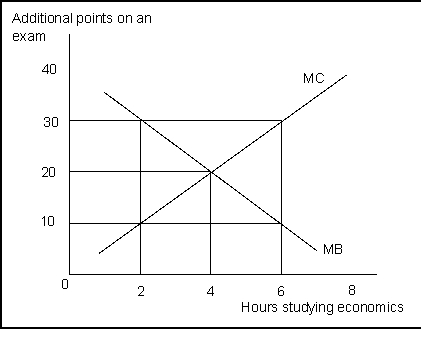 -(Exhibit: Marginal Benefits and Marginal Costs)In the exhibit, more time spent studying economics adds points to economics scores but subtracts points from accounting scores.When the student studies economics for 4 hours, the marginal benefit is _______ ;when the student studies for 6 hours, the marginal benefit is _______ .
-(Exhibit: Marginal Benefits and Marginal Costs)In the exhibit, more time spent studying economics adds points to economics scores but subtracts points from accounting scores.When the student studies economics for 4 hours, the marginal benefit is _______ ;when the student studies for 6 hours, the marginal benefit is _______ .
(Multiple Choice)
4.8/5  (43)
(43)
To be effective in facilitating exchange, property rights must be:
(Multiple Choice)
4.9/5  (44)
(44)
Market power exerted by either buyers or sellers is an example of:
(Multiple Choice)
4.7/5  (30)
(30)
 -(Exhibit: Surplus and Demand)The market demand curve can be considered to be a _______ curve.
-(Exhibit: Surplus and Demand)The market demand curve can be considered to be a _______ curve.
(Multiple Choice)
4.7/5  (34)
(34)
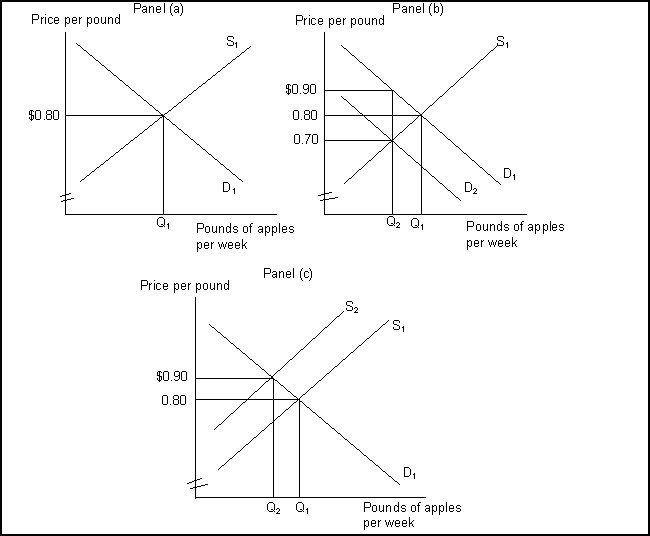 -(Exhibit: Markets and Efficiency)In Panel (b)demand shifted from D1 to D2 reflecting a change in consumer preferences.Based upon that, which of the following statements is true?
-(Exhibit: Markets and Efficiency)In Panel (b)demand shifted from D1 to D2 reflecting a change in consumer preferences.Based upon that, which of the following statements is true?
(Multiple Choice)
4.9/5  (41)
(41)
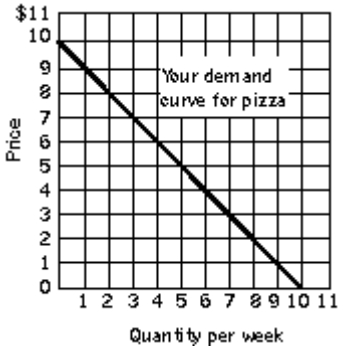 -(Exhibit: Measuring Consumer Surplus)If pizzas were free, your consumer surplus would be:
-(Exhibit: Measuring Consumer Surplus)If pizzas were free, your consumer surplus would be:
(Multiple Choice)
4.8/5  (46)
(46)
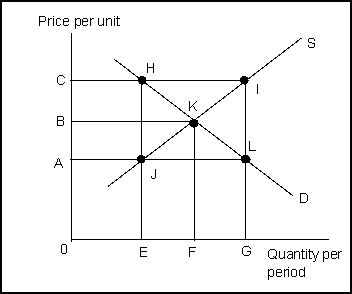 -(Exhibit: Market Failure 1)If the market produces quantity E, then:
-(Exhibit: Market Failure 1)If the market produces quantity E, then:
(Multiple Choice)
4.8/5  (38)
(38)
Whenever a species is threatened with extinction, it is likely that:
(Multiple Choice)
4.8/5  (39)
(39)
Suppose that the expected exam scores from studying economics for 0, 1, 2, or 3 hours are 65, 80, 90, and 95 points, respectively, while the expected exam scores for studying 0, 1, 2, or 3 hours of accounting are 50, 65, 70, and 70 points, respectively.With 3 total hours of study time, the marginal benefit in terms of your economics score of spending the first hour studying economics is _______ points.
(Multiple Choice)
4.9/5  (36)
(36)
According to the Case in Point on Saving the Elephant, granting exclusive and transferable property rights in elephants to the villagers of Botswana, Zimbabwe, and Namibia in southern Africa:
(Multiple Choice)
4.9/5  (40)
(40)
To be effective in facilitating exchange, property rights must be:
(Multiple Choice)
4.9/5  (33)
(33)
Showing 181 - 200 of 228
Filters
- Essay(0)
- Multiple Choice(0)
- Short Answer(0)
- True False(0)
- Matching(0)